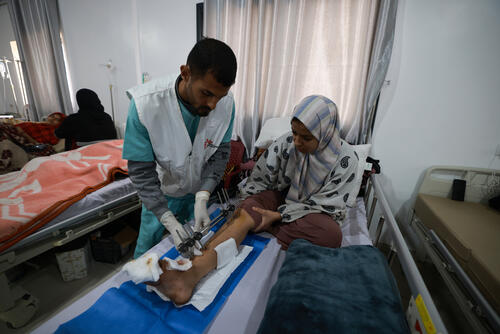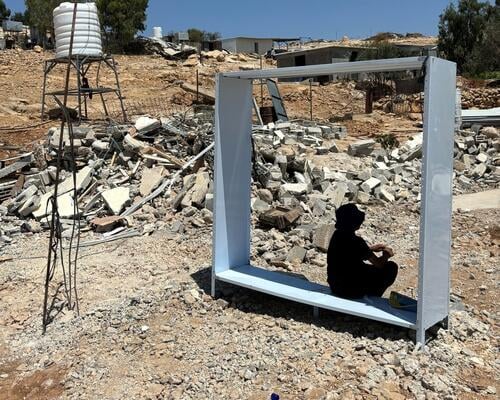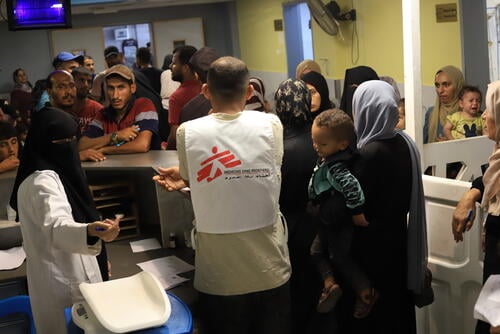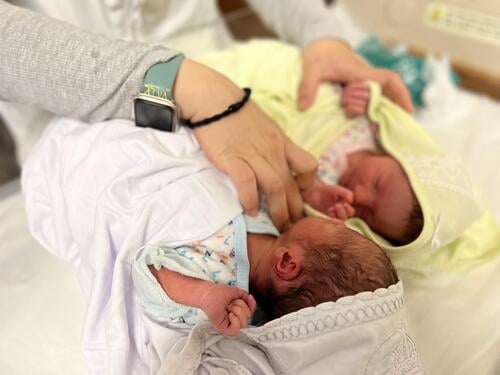The war in Gaza, Palestine, has displaced some 1.5 million people to Rafah, in the southern corner of the Gaza Strip. Over the past four months, most people in Rafah have been displaced multiple times, carrying what few belongings they have left.
Plastic tents have been erected on every available piece of land, on the streets and open ground in and around Rafah city. Now there is no space left: cars can barely drive on the overcrowded streets, and even walking can be challenging.
People sheltering in the area have been deprived of their basic needs, including water, food and shelter, and have been subjected to repeated evacuation orders and forced displacement by the Israeli military.
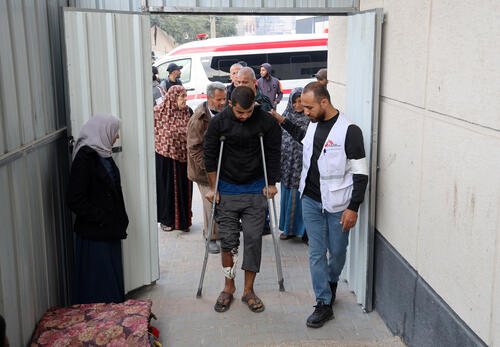
In recent weeks, attacks have intensified on Rafah and people have started to flee back north towards the Middle Area of Gaza. At the same time, evacuation orders and attacks on Nasser hospital, in the southern city of Khan Younis, forced patients undergoing treatment to leave the hospital. There is no safe place in Gaza; people have nowhere left to go.
Trauma injuries and burns require long-term treatment
At Rafah Indonesian Field Hospital, our teams are treating people for war-related trauma injuries and burns that require continued, sustained care.
“Most patients with injuries need dressing changes at least twice a week, as well as antibiotics, pain killers and constant medical care,” says Guillemette Thomas, MSF medical coordinator. “If the injury is severe, the patient also needs physiotherapy to avoid losing the functionality of the injured limb.”
Most of MSF’s patients are staying in tents or public buildings turned into shelters, where their dire living conditions make it almost impossible to keep open wounds clean, resulting in infections. This high risk of infections is one of the main issues for injured patients in Rafah.
Without proper medical treatment, infections can spread through the body, to the bones, causing a lot of pain and leading to death if left untreated.
Since mid-December 2023, our teams in Rafah Indonesian Field Hospital have been supporting the post-operative, inpatient and outpatient departments, providing wound dressings and physiotherapy and carrying out small surgical procedures.
So far, we have provided more than 5,800 consultations and admitted more than 200 patients for treatment. In the outpatient department, some 60 per cent of patients seen by MSF teams have trauma injuries; the remaining 40 per cent have war-related burns. More than 40 per cent of the outpatient department’s patients are children.
The medical response in Gaza only scratches the surface of people’s overwhelming needs for medical care, with local health officials reporting that almost 70,000 Palestinians have been injured since October 2023.
We have seen that when hospitals are evacuated, patients leave on foot, in wheelchairs or even lying in hospital beds.Guillemette Thomas, MSF medical coordinator
Pending humanitarian catastrophe as attacks escalate in Rafah
In the past week, Israeli authorities have made public their intention to evacuate people from Rafah and launch a ground offensive in the area. Attacks have intensified and people sheltering in Gaza’s far south are fearing for their lives.
For patients needing continued care for trauma wounds or burns, another forced displacement could result in severe health complications, or possibly death.
“In other hospitals in Gaza, we have seen that when hospitals are evacuated, patients leave on foot, in wheelchairs or even lying in hospital beds,” says Thomas.
“This can be extremely dangerous for them. When someone with a severely fractured leg starts to walk, it compromises their possibility to regain mobility and can have life-threatening consequences.”
Since the war began, our medical teams and patients have been forced to evacuate nine different health facilities in Gaza, after coming under fire from tanks, artillery, fighter jets, snipers, and ground troops, or after being subject to an evacuation order. Medical staff and patients have been arrested, abused, and killed.

Patient testimony
Providing people with medical care and scaling up lifesaving humanitarian assistance has been made almost impossible by the intensity of Israel’s bombing and shelling of Gaza, as well as by intense fighting.
Our teams are extremely worried about the escalations of violence in Rafah and the impending evacuation of the area, where millions of people are sheltering, including the wounded, the sick, the elderly and those with limited mobility.
“People have lost everything – their homes, their loved ones, their basic needs and security – and now they are barely surviving, living in muddy plastic tents or on the floors of hospitals and schools, without any belongings,” says Lisa Macheiner, MSF project coordinator.
“Rafah and the whole of Gaza need a safe humanitarian response at a much larger scale, which is only possible with a sustained and immediate ceasefire.”
MSF teams continue to provide medical care in Rafah in four hospitals, one clinic, two health posts, and in one hospital in the Middle area. However, without an end to the relentless bombings and forced displacement, providing humanitarian aid is almost impossible.
We reiterate our call for an immediate and sustained ceasefire, which is the only way to put an end to the humanitarian catastrophe unfolding in Gaza.



